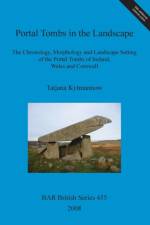- The Chronology, Morphology and Landscape Setting of the Portal Tombs of Ireland, Wales and Cornwall
von Tatjana Kytmannow
127,00 €
Portal tombs are the least researched megalithic class in Ireland, despite the fact that they have one of the widest distributions of all tomb classes. This study sets out to present a critical synthesis of the previous work on portal tombs and to investigate the chronology, morphology and landscape setting of this enigmatic tomb class. It concerns itself with all portal tombs, in Ireland, Wales and Cornwall. Chapter 1 defines the research methods and the main research questions and aims. Chapters 2 and 3 present the history of research in two parts. All excavations, antiquarian explorations, classification models and the theoretical concepts underlying them are discussed in chapter 2, while landscape studies, phenomenology and my own theoretical approach are discussed in chapter 3. Chapter 4 analyzes the morphology of portal tombs and the different architectural elements, i.e. capstone, portal stones, cairns and so on, and chapter 5 discusses subtypes, hybrids with other tomb classes and regional variations. Chapters 6 and 7 both deal with the chronology of portal tombs. Chapter 6 re-assesses the material culture found in portal tomb contexts and establishes a relative chronology, and chapter 7 introduces the newly obtained radiocarbon assays and puts them into context with the previously obtained dates. Chapter 8 provides an analysis of the various landscape elements found around portal tombs and suggests several conclusions as to what role the landscape might have played for portal tomb builders. Chapter 9 looks in detail at eight case studies, macro-regions with portal tomb clusters, to see if these might provide clues as to how society was organised, if there is evidence for settlement and how portal tombs related there to other tomb classes and to the landscape. Chapter 10 looks at portal tombs and settlements, especially using Early Neolithic settlement evidence, but also comparing it with the Late Mesolithic. Finally Chapter 11 provides a summary and conclusions. A full catalogue is provided in Appendix A containing all 225 sites of portal tombs which had been named as such.

